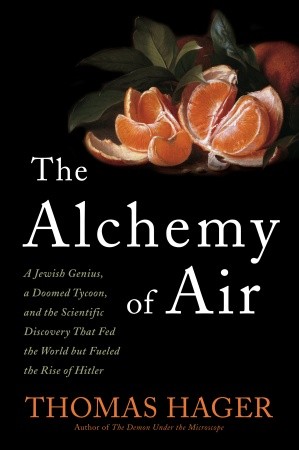Speeches Shim
The Alchemy of Air by Thomas Hager
Chosen by: USAID Administrator Rajiv Shah
Synopsis:
The publisher of The Alchemy of Air: A Jewish Genius, a Doomed Tycoon, and the Scientific Discovery That Fed the World but Fueled the Rise of Hitler calls this 2008 book by Thomas Hager a story of "tragic genius, cutting-edge science, and the discovery that changed billions of lives." Who knew there could be so much drama surrounding fertilizer?
Hager tells how two men – "brilliant, self-important Fritz Haber and reclusive, alcoholic Carl Bosch" – answered a call at the start of the 20th Century for the world's scientists to address what was then a looming global disaster of starvation. Though the personal stories of the scientists prove tragic, the overarching narrative is an account the publisher describes as "a discovery that changed the way we grow food and the way we make war–and that promises to continue shaping our lives in fundamental and dramatic ways."

Administrator Shah: This book reminds us of the serendipity of scientific inquiry. It's about the invention of fixed nitrogen fertilizer, a single invention that dramatically improved food production and helped support the massive population growth that took place over the last 70 years.
When people think about fertilizer, "world changing" may not be the first phrase that comes to mind. But fertilizer has made modern life possible. In retrospect, it's one of the most important technological innovations of the 20th century.
How countries apply nitrogen-based fertilizer varies. Where it is overused it can have significant negative consequences for local ecosystems. In some countries, like China, they use almost 160 kilograms of fertilizer per hectare. While in the United States, the number was 60 or 70 kilograms per hectare a few years ago.
And then there are the countries that use virtually no fertilizer. In sub-Saharan Africa or dry-land South Asia – where most of the world's poor farmers struggle to produce enough food to feed their families – they use about 8 kilograms per hectare.
Where fertilizer is not used, you see children going to bed hungry every night and an increase in the number of children who are stunted over 30 or 40 years ago. If children don't get adequate nutrition, their brains don't develop; and they can't learn and contribute to society to the extent of their capacity. So the story of the application of fertilizer and the disparities of that application tell the story of both environmental and human consequences.
Discussion Questions
- What about this scientific discovery surprised or impacted you the most?
- What lessons can developing countries striving to build their agriculture sectors take away from this book?
- How can countries balance the immediate need to increase food production and the long-term need to be good stewards of the soil in which the food is grown?
- Is it more cost effective for international development organizations to risk their limited funds on backing potential scientific discoveries or to spend those resources on strategies with proven track records that help people survive today?
Get Involved: Use the comments section of this blog post to share your answers, or tweet them to us at #fallsemester


Comment
Make a general inquiry or suggest an improvement.